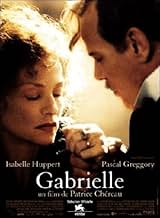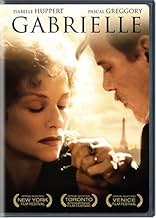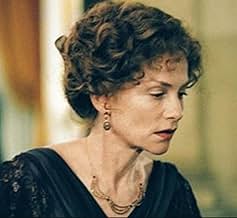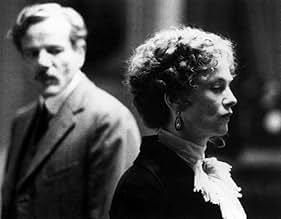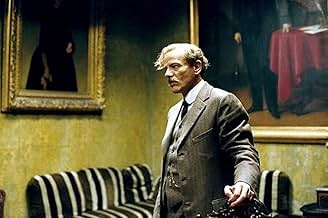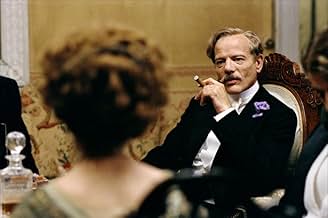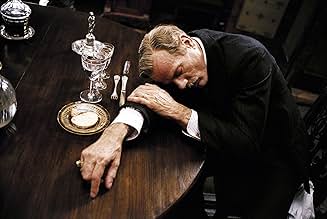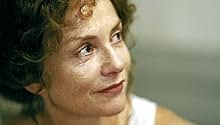Gabrielle
- 2005
- 1h 30m
IMDb RATING
6.2/10
2.2K
YOUR RATING
The marriage between Gabrielle and Jean begins to fray after the discovery of a letter that belongs to Gabrielle.The marriage between Gabrielle and Jean begins to fray after the discovery of a letter that belongs to Gabrielle.The marriage between Gabrielle and Jean begins to fray after the discovery of a letter that belongs to Gabrielle.
- Director
- Writers
- Stars
- Awards
- 3 wins & 6 nominations total
Florent Bigot de Nesles
- Invité
- (uncredited)
Philippe Calvario
- Guest
- (uncredited)
- Director
- Writers
- All cast & crew
- Production, box office & more at IMDbPro
Featured reviews
Gabrielle (2005) is a French film written and co-directed by Patrice Chéreau. It's based on a novella by Joseph Conrad.
Pascal Greggory plays Jean Hervey. He's a very wealthy businessman. He's healthy and apparently happy.
His wife, Gabrielle, is elegant and sophisticated, albeit aloof. Gabrielle is portrayed by Isabelle Huppert.
This movie sounded good on paper, but it just didn't work for me. Partly that's because Patrice Chéreau is better known as a theater director and the film looks more like a play than it looks like a movie.
Huppert is one of my favorite actors, but she's wrong for this role. We're told over and over that the couple has been married ten years, but Huppert looks closer to 50 when, in context, she should be 35 or 40. (Well, she was 52 at the time, and she has every right to look 50, but it's not appropriate for this movie.)
Finally, director Chéreau uses strange and unnecessary devices. He switches from black-and-white to sepia to color. He uses title cards like the old silent movies. The characters talk and talk, but nothing much gets said.
If a film isn't going to be enjoyable, it should teach us something. All I learned from this movie is that if you speak cruelly to your maids, they just have to bear it. Apparently, it's part of the job description to just endure.
I didn't enjoy any aspect of this film. It's hard for me to criticize an Isabel Huppert movie. I thought she could make it work. Not this time. Gabrielle has a dreadful IMDb of 6.4. I agree with my fellow raters and rated it 6.
Pascal Greggory plays Jean Hervey. He's a very wealthy businessman. He's healthy and apparently happy.
His wife, Gabrielle, is elegant and sophisticated, albeit aloof. Gabrielle is portrayed by Isabelle Huppert.
This movie sounded good on paper, but it just didn't work for me. Partly that's because Patrice Chéreau is better known as a theater director and the film looks more like a play than it looks like a movie.
Huppert is one of my favorite actors, but she's wrong for this role. We're told over and over that the couple has been married ten years, but Huppert looks closer to 50 when, in context, she should be 35 or 40. (Well, she was 52 at the time, and she has every right to look 50, but it's not appropriate for this movie.)
Finally, director Chéreau uses strange and unnecessary devices. He switches from black-and-white to sepia to color. He uses title cards like the old silent movies. The characters talk and talk, but nothing much gets said.
If a film isn't going to be enjoyable, it should teach us something. All I learned from this movie is that if you speak cruelly to your maids, they just have to bear it. Apparently, it's part of the job description to just endure.
I didn't enjoy any aspect of this film. It's hard for me to criticize an Isabel Huppert movie. I thought she could make it work. Not this time. Gabrielle has a dreadful IMDb of 6.4. I agree with my fellow raters and rated it 6.
I saw this dark oeuvre yesterday at the Boston French Film Festival at the MFA.It was chosen to be the Opening night Film and was sold out.The director was present and spoke at length about what drew him to make the film and what was important about it- for him. I felt the film-making was fascinating. From the opening sequence, where the footage in the train station is SO realistic in its early 20th c. appearance, and throughout the film, I found the cinematography to be lush, stylized, extremely well-framed and riveting .It is a perfect voice for the story. The actors are always IN YOUR FACE and this fact, combined with an economic and well written script, heavy dark music, tremendously accurate and effective set design, and spot-on acting, made for an extremely moving and interesting exploration of the story. For me, in tone and context, it felt a bit like Henry James' Portrait of a Lady (and probably works by Ibsen and others) Isabelle Huppert and her husband are extremely wealthy, cold, unemotional,detached from themselves and others, and 'safe' in that world. Their house-where 99% of the film takes place, is a dark, heavy, classical, structured prison.(The director's background in stage directing is very evident in this film.) One little bubble bursts from that prison and then things change and the disintegration begins. It gives one a great deal to think about. My only problem with the film is the MUSIC.The music is as much an element of the film as the actors. That is not, in and of itself, a bad thing, but in the last 20 minutes of the film, it is just WAY TOO MUCH: too heavy, too loud, and too repetitive;a bit like Bruchner at his worst. But if you are able to see a DVD of this, you can turn down this overkill. If you are lucky enough to see the film live (so important for major artistic cinematography like this) you'll just have to deal with it; maybe it won't bother you so much.At any rate, the film will provide those so inclined with many things to think about and discuss. And visuals to remember. For me,I will always carry the image of Huppert, dressed in black, on that enormous settee... it's a Degas.
Obviously we don't all like the same things. One commentator said it was all just talk, as if that were a bad thing. I happen to love language and words, and in particular love the French language. So that is the reason I rent a movie in French. I also have a very strong aversion to "action movies" where language is reduced to "Ow! Help! Duck!" On the other hand, movies like Gabrielle where minute movements of the psyche are explored in depth by minimalistic means, these are what grip me, move me, keep me interested. I do not really think the movie is like an opera -- it was more like a french play -- the delivery and velocity of the spoken word was very much in the style of french live theater.
My only caveat is that French-ness and Conrad seem a strange mix to me. There was another French movie that was made on a Conrad text, and I had a similar reaction. Conrad is not writing about French society. And yet the action has been transplanted to France. And it seems an entirely incongruous transplant to me -- plopping the joyless uprightness of puritanical England (the only place name mentioned is "West End Station" into a such a lively Latin culture which has always had a much more relaxed attitude towards love and sex... well,to me it's just incongruous.
Nevertheless, it was an cleverly crafted movie, and the musical score by Fabio Vacchi was unearthly beautiful.
My only caveat is that French-ness and Conrad seem a strange mix to me. There was another French movie that was made on a Conrad text, and I had a similar reaction. Conrad is not writing about French society. And yet the action has been transplanted to France. And it seems an entirely incongruous transplant to me -- plopping the joyless uprightness of puritanical England (the only place name mentioned is "West End Station" into a such a lively Latin culture which has always had a much more relaxed attitude towards love and sex... well,to me it's just incongruous.
Nevertheless, it was an cleverly crafted movie, and the musical score by Fabio Vacchi was unearthly beautiful.
Based on "The Return" by Joseph Conrad, "Gabrielle" tells the story of a woman in turn-of-the-century Paris who rebels against a loveless marriage.
Jean Hervey is a successful newspaper publisher whose life is ruled far more by social obligation and ritual than by emotion or passion. He extends this philosophy to all areas of his life, even to his own wife, whom he sees less as a person with a basic human need for intimacy and passion than as an attractive ornament to be placed beside all the other artwork in his impressive collection of Greek statuary. He even proclaims rather proudly - as if it were evidence of his imperviousness to the weakness of the flesh - that, though he and his wife do share the same bedroom, they sleep in different beds. Yet, he is not above deluding himself into believing that he actually loves her, although he is the first to admit that real love requires far too much effort to really be worth his time. He takes pride in her "placid" nature, which he feels serves him well in her function as hostess for the dinner parties he throws for his friends like clockwork every Thursday night. One day, however, Jean's studiously ordered world is shattered when he finds a note from Gabrielle informing him that she has run off with another man. A few moments later, though, Gabrielle mysteriously returns home, having been unable to make that final break for reasons not entirely fathomable either to herself or to us. The remainder of the film is spent examining the couple's efforts to cope with the situation.
This theme - of an aristocratic, free-spirited woman trapped in a figurative gilded cage by either the man in her life or society as a whole - was not exactly a novel one even at the time the story was written, but what separates "Gabrielle" from similar works is its unique concentration on the man instead of the woman, on HIS repression and inadequacies rather than hers. This leads to a conclusion rich in irony as Jean, the passionless purveyor of propriety, becomes ever more eaten up by his own jealousies and obsessions. Jean reveals much of what he's thinking through voice-over narration, as Gabrielle serves as a catalyst for his own emotional revolution.
If "Gabrielle" reminds us of anything, it is of a film by Ingmar Bergman, one in which the characters talk out the minutiae of their relationships and their innermost feelings and thoughts at almost agonizing length - tedious to some in the audience, perhaps, but fascinating to others. Patrice Chereau and Anne-Louise Trividic's literate screenplay plumbs the depths of the two souls involved, while Chereau's direction keeps things moving by employing a camera that sweeps with almost reckless abandon through the dusky rooms and crowded salons where the action takes place.
Isabelle Huppert and Pascal Greggory are perfectly cast foils as the husband and wife for whom "love" is no longer a viable option. Each of the actors seethes with an intensity that reveals the passions that have long lain dormant under the couple's placid exteriors.
Although Gabrielle may be the first of the two to throw off the cloak of respectability and go for what really matters, it is Jean's intense struggle with his own inner demons that commands most of our attention. For despite the title being "Gabrielle," the film turns out to be much more Jean's story in the end than hers.
Jean Hervey is a successful newspaper publisher whose life is ruled far more by social obligation and ritual than by emotion or passion. He extends this philosophy to all areas of his life, even to his own wife, whom he sees less as a person with a basic human need for intimacy and passion than as an attractive ornament to be placed beside all the other artwork in his impressive collection of Greek statuary. He even proclaims rather proudly - as if it were evidence of his imperviousness to the weakness of the flesh - that, though he and his wife do share the same bedroom, they sleep in different beds. Yet, he is not above deluding himself into believing that he actually loves her, although he is the first to admit that real love requires far too much effort to really be worth his time. He takes pride in her "placid" nature, which he feels serves him well in her function as hostess for the dinner parties he throws for his friends like clockwork every Thursday night. One day, however, Jean's studiously ordered world is shattered when he finds a note from Gabrielle informing him that she has run off with another man. A few moments later, though, Gabrielle mysteriously returns home, having been unable to make that final break for reasons not entirely fathomable either to herself or to us. The remainder of the film is spent examining the couple's efforts to cope with the situation.
This theme - of an aristocratic, free-spirited woman trapped in a figurative gilded cage by either the man in her life or society as a whole - was not exactly a novel one even at the time the story was written, but what separates "Gabrielle" from similar works is its unique concentration on the man instead of the woman, on HIS repression and inadequacies rather than hers. This leads to a conclusion rich in irony as Jean, the passionless purveyor of propriety, becomes ever more eaten up by his own jealousies and obsessions. Jean reveals much of what he's thinking through voice-over narration, as Gabrielle serves as a catalyst for his own emotional revolution.
If "Gabrielle" reminds us of anything, it is of a film by Ingmar Bergman, one in which the characters talk out the minutiae of their relationships and their innermost feelings and thoughts at almost agonizing length - tedious to some in the audience, perhaps, but fascinating to others. Patrice Chereau and Anne-Louise Trividic's literate screenplay plumbs the depths of the two souls involved, while Chereau's direction keeps things moving by employing a camera that sweeps with almost reckless abandon through the dusky rooms and crowded salons where the action takes place.
Isabelle Huppert and Pascal Greggory are perfectly cast foils as the husband and wife for whom "love" is no longer a viable option. Each of the actors seethes with an intensity that reveals the passions that have long lain dormant under the couple's placid exteriors.
Although Gabrielle may be the first of the two to throw off the cloak of respectability and go for what really matters, it is Jean's intense struggle with his own inner demons that commands most of our attention. For despite the title being "Gabrielle," the film turns out to be much more Jean's story in the end than hers.
Joseph Conrad wrote his novella, "The Return" in tribute to Henry James, whose "The Spolis of Poynton" inspired him to write about a man who regards people as objects of ownership-- and is gobsmacked when his most prized possession, his wife, walks out on him. On the page it's a tight little chamber piece, with overtones of Ibsen and Strindberg. On the screen the great Patrice Chereau turns it into something else -- an opera in which the images sing rather than the performers. Pascale Greggory is in top form as a haute bourgeois "man who has everything" whose smugness masks a total disdain for feeling. When the superb Isabelle Huppert leaves a note to say she's leaving, the brandy decanter he drops echoes like the sword of Siegfried in Chereau's famed production of Wagner's "Ring" cycle. (Fabio Vacchi's amazing Alban Berg-like score seals the deal on this aspect of the work.) The dramatic set-to that results finds our non-hero groping for words to speak to the feelings he's never experienced before -- longing, regret, and finally grief at the loss of a love he's never allowed himself to know.
As far from Merchant-Ivory as one can possibly imagine Chereau and production designer Olivier Radot (new to la famille Chereau) place the action in a museum-like mansion where a small army of servants move about at the service of this infernal couple and their friends. Scenes of their fashionable parties suggest the Verdurins in Proust with cinematographer Eric Gauthier indulging in a color palette that makes the screen seem like a Manet come to life.
Chereau is doubtless familiar with what Georges Bataille wrote of Manet: "A little superficial perhaps, but driven by inner forces that gave him no rest, Manet was possessed by a desire for something beyond his reach which he never fully understood and which left him for ever tantalized and unsatisfied, on the brink of nervous exhaustion." That's perfect description of the emotional heart of this very great film.
As far from Merchant-Ivory as one can possibly imagine Chereau and production designer Olivier Radot (new to la famille Chereau) place the action in a museum-like mansion where a small army of servants move about at the service of this infernal couple and their friends. Scenes of their fashionable parties suggest the Verdurins in Proust with cinematographer Eric Gauthier indulging in a color palette that makes the screen seem like a Manet come to life.
Chereau is doubtless familiar with what Georges Bataille wrote of Manet: "A little superficial perhaps, but driven by inner forces that gave him no rest, Manet was possessed by a desire for something beyond his reach which he never fully understood and which left him for ever tantalized and unsatisfied, on the brink of nervous exhaustion." That's perfect description of the emotional heart of this very great film.
Did you know
- ConnectionsReferenced in New York - Section criminelle: Blind Spot (2006)
- How long is Gabrielle?Powered by Alexa
Details
Box office
- Gross US & Canada
- $332,829
- Opening weekend US & Canada
- $30,676
- Jul 16, 2006
- Gross worldwide
- $2,775,311
- Runtime
- 1h 30m(90 min)
- Color
- Sound mix
- Aspect ratio
- 2.35 : 1
Contribute to this page
Suggest an edit or add missing content

